Should I Learn Java For Cracking The Coding Interview Reddit
3 Month Coding Interview Preparation Bootcamp
The 3-month Cocky-Study Roadmap to Success at Software Engineering Interviews
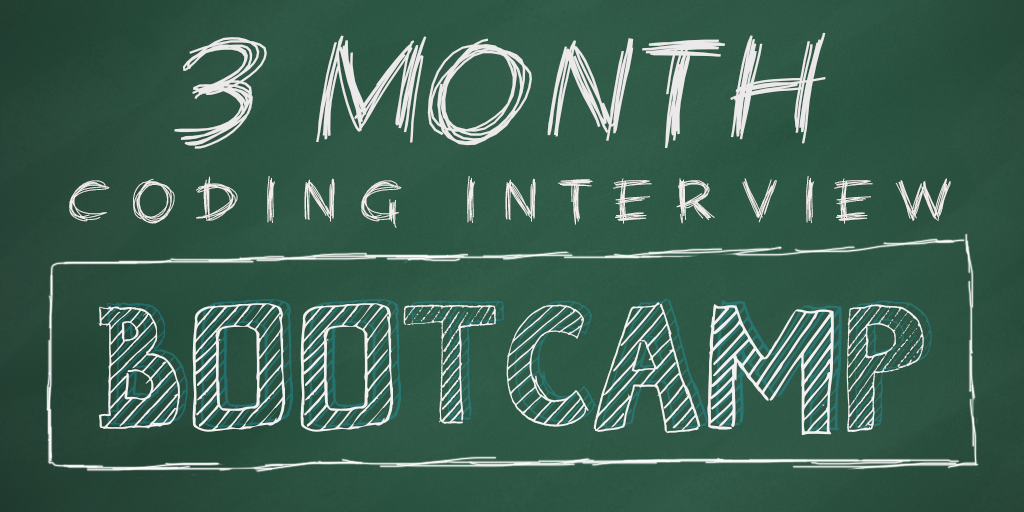
(Some background: I've interviewed hundreds of candidates for software engineering science jobs at Facebook and Microsoft. I've also failed several coding interviews myself when I wasn't prepared.
I originally started writing this as an answer to a Quora question about the roadmap for software engineering interviews. Eventually, the reply became then long that I thought it warranted a blog post of its own.)
Iii months — Really?
Permit's go this out of the mode. People ask me a lot: what's a reasonable timeframe to scissure the coding interviews if y'all're starting from scratch? (i.e., y'all haven't interviewed in the past several years.)
I would say that iii months is a reasonable timeframe. Yes, really, three months. And barring that, at the very least dedicate 4–6 weeks if you haven't interviewed in a while. You can probably get abroad with less than that if you have interviewed in the final 12 months or then.
Now for the meat. Beneath are the five main sections that software technology interviews at "Large Tech" companies like Facebook, Google, Microsoft, etc. will consist of:
- Coding Interviews (focusing on trouble-solving, data structures and algorithms).
- OS and Concurrency Concepts
- System Design Interviews.
- Object-Oriented Pattern Interviews
- Cultural fit interviews
Similar any other long-term goal that requires consistent piece of work (such as getting ready to run a marathon), following some kind of construction is crucial, as it will encourage you lot to stay on track on days that your motivation might be waning.
To help with that, I've created a 12-week grooming program that yous tin follow to set up for your next coding interview. If you follow the plan over these 12 weeks, you'll cover all of the topics mentioned in a higher place in a structured style. Permit's get started.
Calendar week 0 — What Programming language should you use?
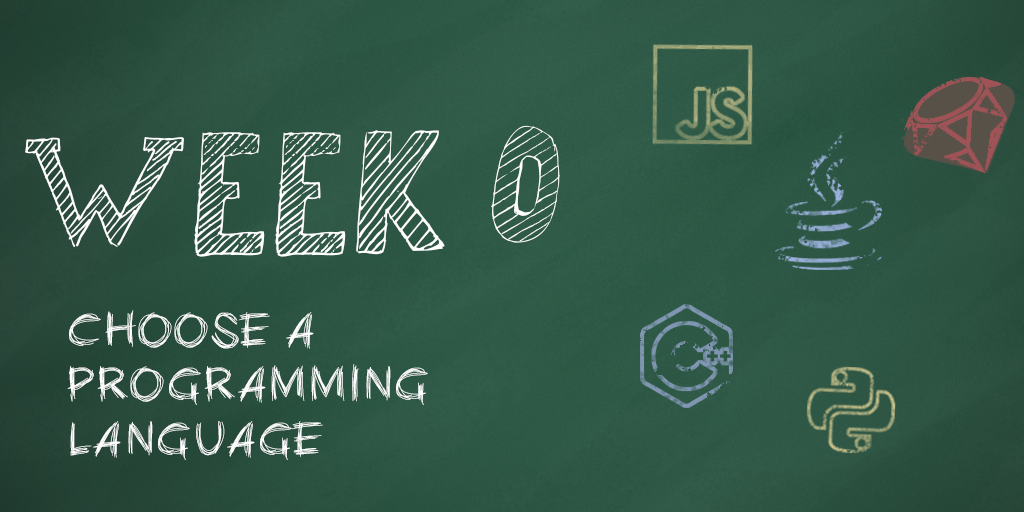
Selection a programming linguistic communication and then stick with information technology. I'm oftentimes asked: what if I know more than 1? Would, for case, Python be meliorate than Java?
The respond, of course, is that the best programming language for your coding interviews is the linguistic communication that you're about comfy with. Almost companies/interviewers don't care as long equally you can show proficiency in any one mainstream programming language.
In some of the worst cases, I've seen people deciding to "switch" to a different programming language in the middle of the interview. That'due south a big turn-off and a waste matter of time. Don't practise that. Selection 1 early, and stick to information technology throughout.
Calendar week one — Brush upwardly on the basics of your favorite Programming language
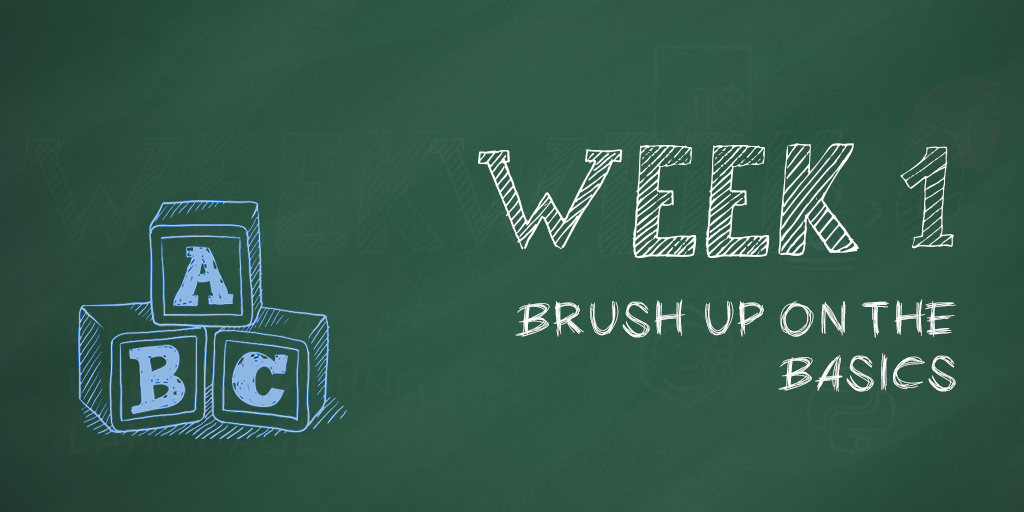
Castor up on your chosen programming language. There are going to be a lot of things that you've forgotten when yous have been coding for your day job even using your preferred language. I've seen people struggling to recall things like:
- How to read/write from/to files
- How to read input from the console
- How to split strings
- Is string length a function or a property (answer: information technology doesn't matter, but even so reflects poorly on y'all)
- How to declare and use 2nd arrays
- In C/C++, how to handle null-terminated strings
Once, I saw a candidate get confused and non exist able to retrieve how to figure out if a number was positive or negative. (I'grand sure they knew it — they just had a brain freeze).
The time and mental energy that you spend on trying to recall the nuances of your called programming language would be much amend spent on actually solving the problem and exhibiting your problem-solving skills. That's what interviewers want to see.
Some companies, like Lyft and Salesforce, require yous to solve issues on a laptop. Y'all are expected to write complete programs that pass given test cases. In these cases, you lot might take to:
- Process control line arguments
- Parse CSV or text files
Of course, you could just Google those, but that would be time spent on trivial tasks that are necessary simply don't help you stand out.
Most other companies, including Amazon and Google amidst countless others, volition crave you to solve problems on a white board. This is a very different experience, requiring some different skills than coding in an IDE. Now is the time to offset practicing actually writing out code (while talking through your idea process) to flex those muscle.
Weeks 2 & 3 — Data Structures and Algorithms

Start revising Computer Science concepts like Data Structures and Algorithms. You know, those concepts that you lot once studied in your undergrad and have never looked at since — they're actually quite useful in coding interviews. Here are some relevant resources:
- For Python, look at Data Structures in Python for Coding Interviews
- For Java, await at Data Structures in Coffee for Coding Interviews
- For JavaScript, look at Data Structures in JavaScript for Coding Interviews
- For C++, check out Data Structures in C++ for Coding Interviews, as well as Algorithms in C++ for Coding Interviews.
- For Algorithms in diverse Coding Languages, bank check out Algorithms and Complexity Analysis: An interview refresher
- For Big O notation and complexity analysis, look at Big O for Coding Interviews and Beyond. You tin can too check out this post titled "The insider's guide to algorithm interview questions" which gives yous a detailed look at complexity analysis and how to work with it.
Think to revise topics similar:
- Complexity Analysis (a.k.a BigO)
- Arrays
- Stacks
- Queues
- Linked Listing
- Trees
- Tries (They are effectively trees, but information technology's still good to call them out separately).
- Graphs (BFS and DFS)
- Hash Tables
- Heaps
- Sorting
- Searching
Weeks iv & v — Practice simple Data Structure and Algorithmic challenges

Equally yous are familiarizing (or re-familiarizing) yourself with data structures, starting time practicing relatively simple coding problems associated with these data structures and algorithms.
These questions are typically not asked in interviews at big tech companies. Even if they are, they're usually used every bit fizz-buzz type warm-up problems. Such questions are also common during phone interviews. Even so, practicing these coding interview questions volition assistance you internalize the data structures and assistance you lot tackle the harder questions which y'all'll be practicing a few weeks from now.
Brush upward your array skills with questions similar:
- Remove Even Integers from Array
- Merge Two Sorted Arrays
- Get-go Non-Repeating Integer in an Assortment
- Notice 2d Maximum Value in an Array
Brush up your Linked Listing concepts with questions similar:
- Find Length of Linked List
- Search in Singly Linked List
- Reverse a Linked Listing
- Notice Middle Value of Linked List
Brush upwardly your Stack/Queue skills with questions similar:
- Sort values in Stack
- Create Stack where min() returns minimum value in O(1)
- Implement Two Stacks using ane Array
Practise Tree Problems similar:
- Find minimum value in Binary Search Tree
- Find Tiptop of Binary Tree
- Find kth maximum value in Binary Search Tree
Practice Graph Bug:
- Implement Latitude Commencement Search
- Implement Depth Start Search
- Detect bicycle in Graph
Practice basic Trie Issues:
- Total number of words in Trie
- Detect all words stored in Trie
Do basic Heap problems:
- Observe k smallest elements in a list
- Notice grand largest elements in an array
Weeks 6, seven, 8 — Practice more complex coding interview problems
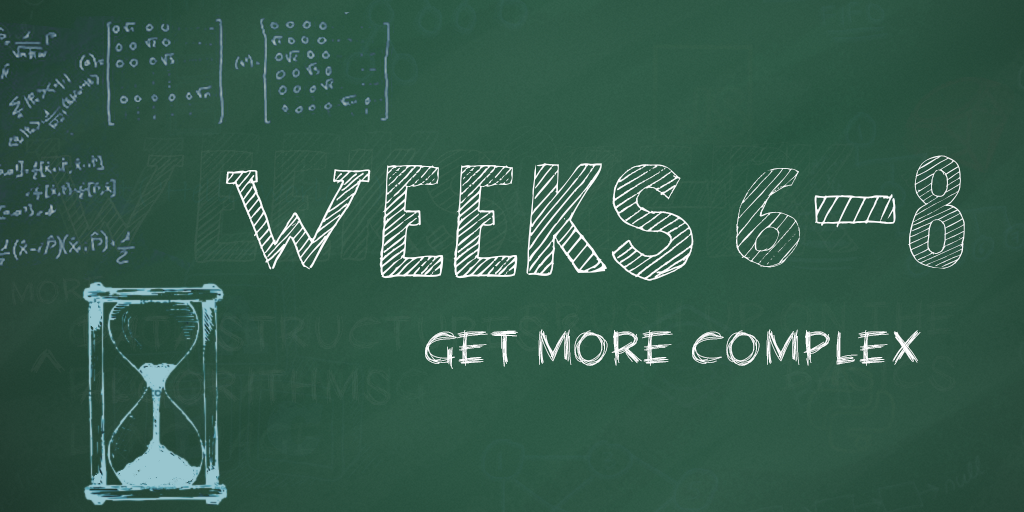
Now that y'all've been practicing more straightforward issues for a couple of weeks, it's time to get existent and start practicing harder questions that are more likely to be asked during coding interviews.
For practice and automatic challenges forth with interactive solutions, await at Grokking the Coding Interview
- .
Here are some guidelines to go along in mind as you solve these problems:
- Now is the time to start timing yourself. Ideally, you shouldn't spend more than than 20–thirty minutes solving whatsoever given problem. (This probably won't exist possible for all questions right away.)
- Don't be discouraged if you are non able to solve a problem inside the allocated fourth dimension. Solve it even if takes you lot a couple of hours, without looking at the solution. This will help you build the confidence that you can solve it and then you tin focus on solving them faster later.
- Start thinking about the Runtime and Memory complexity of each solution. You will take to articulate the complexities in the actual interview clearly, so it's meliorate to start now.
Hither are some sample problems to consider:
- Implement Binary Search
- Find the Intersection signal of two linked lists
- Reverse words in a sentence
- Check if two binary trees are identical
- Clone (deep copy) a directed graph
- Find solutions to a Boggle game
- Determine if there are any three integers in an array that sum equal to the given value.
Yous volition accept to spend 2–3 weeks here. Don't worry if you hit roadblocks and become stuck ofttimes — you will get the hang of information technology after a while. Trust me, questions that look impossible in the first few days first to seem easy after yous've had practise.
Weeks 9 & 10 — System Design Interviews

System design interviews are now an integral office of the software engineering interview procedure — particularly if y'all are applying for a senior role. These interviews have a significant touch on on your "hiring level."
Larn distributed systems concepts like Cap Theorem, Consistency, Partitioning, Load-Balancing etc.
Look at the grade Grokking the Arrangement Design Interview for more than blueprint interview practice.
As part of your System Pattern Interviews, yous are asked to design a "spider web-scale" service. Interviewers are interested in evaluating your power to depict the different parts of a scale-able service, such as:
- How are web-servers load-balanced?
- How are databases shared?
- How are large files stored?
- How is the network fix for redundancy and maximum throughput?
You'll want to practice questions similar:
- Design Instagram
- Blueprint Facebook Newsfeed
- Design Uber
Check out my commodity the Top ten Organisation Design Interview Questions for Software Engineers for more than example questions, tips, and resources for the Organization Pattern Interview.
Calendar week eleven — Bone and Concurrency Concepts:
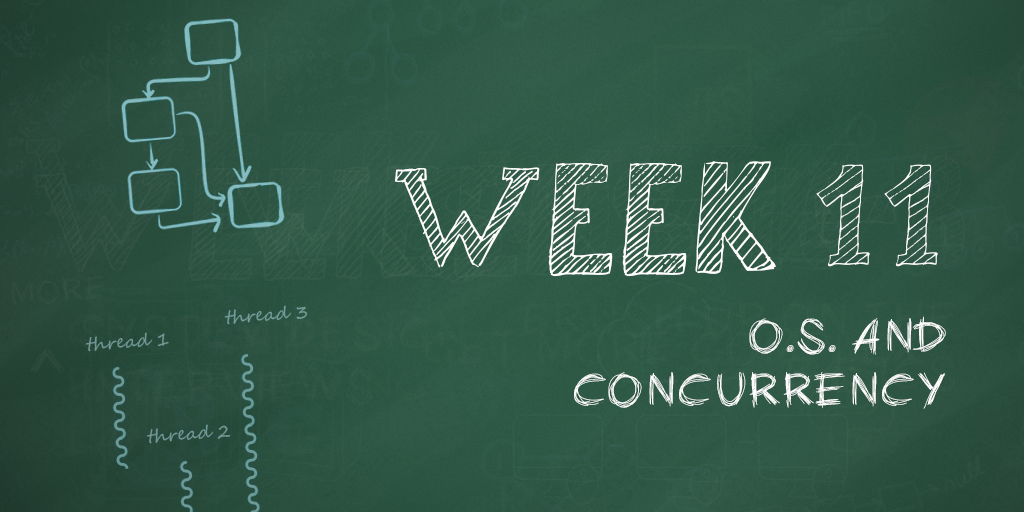
Today, even "budget" laptops and mobile telephone have multiple cores. Understanding concepts similar Threads, Locks, Synchronization, etc. are beneficial whether you lot are edifice a mobile app or a spider web-scale service.
Just similar System Blueprint interview questions — Multi-Threading and Concurrency Interview questions are useful in gauging your level. A junior engineer will struggle with these questions (and are expected to learn more on the task). A relatively senior engineer is supposed to do improve in such questions as they would be responsible for writing a lot of code that takes reward of multiple cores/threads.
C.H. Afzal's "Multithreading and Concurrency for Senior Engineering Interviews" serial is an important one to cheque out, and available in multiple programming languages.
Week 12 — Object-Oriented Blueprint Interviews:

Some common questions include:
- Pattern an ATM
- Design an elevator
- Pattern a Parking System
For more than Object Oriented Blueprint interview questions, bank check out this article: The Top x Object-Oriented Design Interview Questions for Developers.
In Object Oriented Design Questions, interviewers are looking for your understanding of Software Pattern Patterns and your ability to transform the requirements into comprehensible Classes. You spend almost of your fourth dimension explaining the various components, their interfaces and how unlike components interact with each other using the interfaces.
Take a await at Grokking the Object-Oriented Design Interview to learn more virtually questions that are typically asked during OOD interviews.
For learning more almost some all-time practices for object-oriented programming with regards to software design patterns, wait at Software Design Patterns: All-time Practices for Software Developers.
Cultural fit interviews
This is the i that many think won't matter, although this is the interview that sometimes matters the near. For instance, at Amazon, culture is deeply rooted in their hiring process, where a "Bar Raiser" (someone who lives and breathes Amazon culture) can have the final say over y'all getting hired.
The thinking for that is quite simple: if y'all have the right mental attitude, you tin learn new skills and so minor shortcomings in your coding or system design interviews can be overlooked. However, if a person seems to be dispassionate about the product or doesn't await like a team player, they are probably worth hiring even if they are peachy hackers.
At that place's too a famous book chosen The No Asshole Rule. Companies attempt not to hire people who tin be toxic — the long-term cost of doing and so tin be enormous. Companies likewise don't want to rent engineers who are not passionate about the production. Cultural fit interviews are there to weed out such people.
Some of the bones rules of Cultural fit interviews are:
one. Show interest in the product, and demonstrate an understanding of it. (I once had a candidate who told me that Facebook sells cloud services like AWS (Storage/Compute). He had even used one of those. At present, Facebook did purchase Parse.com and kept it alive for a while, but Cloud Infrastructure was never Facebook's chief/core business).
2. Be gear up to describe scenarios where yous had a disharmonize with your teammates or managers and how you resolved it. Delight don't say that you never had a conflict if you lot've been working every bit a software engineer for a few years.
3. Talk about what you desire to achieve in the visitor
4. Talk near some of your recent / most meaning accomplishments as an engineer
5. Talk near some particularly crazy/difficult bugs that y'all encountered.
Conclusion
Grooming for coding interviews takes a lot of time and endeavour, but if that helps yous stand out and prove that you're ready for a complex job, information technology'south worth it. I've constitute information technology helps to continue in mind the value of the end-goal throughout — in this case, the personal satisfaction and financial compensation of landing a big-ticket software job.
Resources
For your reference, hither are a consolidated list of the resource for software-technology interviews that I've mentioned throughout the post:
- Grokking the Coding Interview
- Algorithms and Complexity Analysis: An Interview Refresher
- Mastering Information Structures: An Interview Refresher
- Big O for Coding Interviews and Beyond
- Grokking the System Design Interview
- Grokking the Object-Oriented Pattern Interview
- Grokking Dynamic Programming for Coding Interviews
- Multithreading and Concurrency for Senior Engineering science Interviews
- Software Pattern Patterns: All-time Practices for Software Developers
I'd dearest to know if you have any feedback. Delight accomplish out to me at fahim@educative.io if you have any questions or feedback.
Should I Learn Java For Cracking The Coding Interview Reddit,
Source: https://learningdaily.dev/3-month-coding-interview-bootcamp-904422926ce8
Posted by: reedythrome.blogspot.com


0 Response to "Should I Learn Java For Cracking The Coding Interview Reddit"
Post a Comment